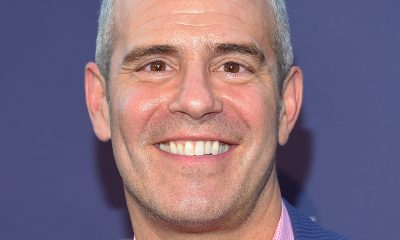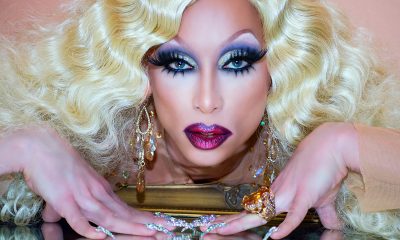a&e features
Sandra Bernhard on ‘Pose,’ ‘Drag Race,’ the ‘Roseanne’ reboot and more
Stand-up legend dishes freely in advance of Pride week D.C. appearance
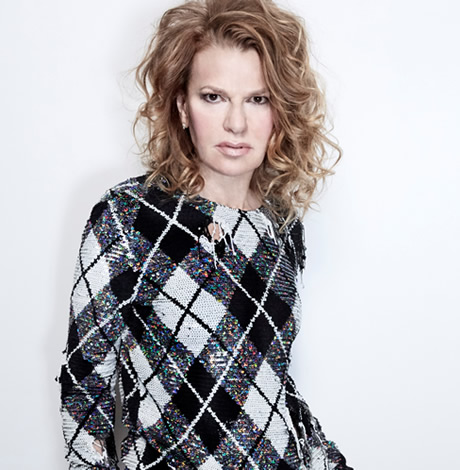
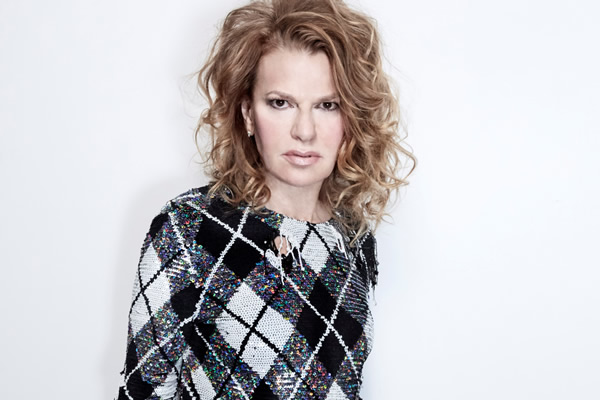
SANDRA BERNHARD says finding a new stylist nearly two years ago was ‘a game changer.’ (Photo by Jordan Graham)
Washington Blade presents: Sandra Bernhard ‘Sandemonium’
Shakespeare Theatre Company
Harman Center for the Arts
Friday, June 8
7:30 p.m.
$59-99
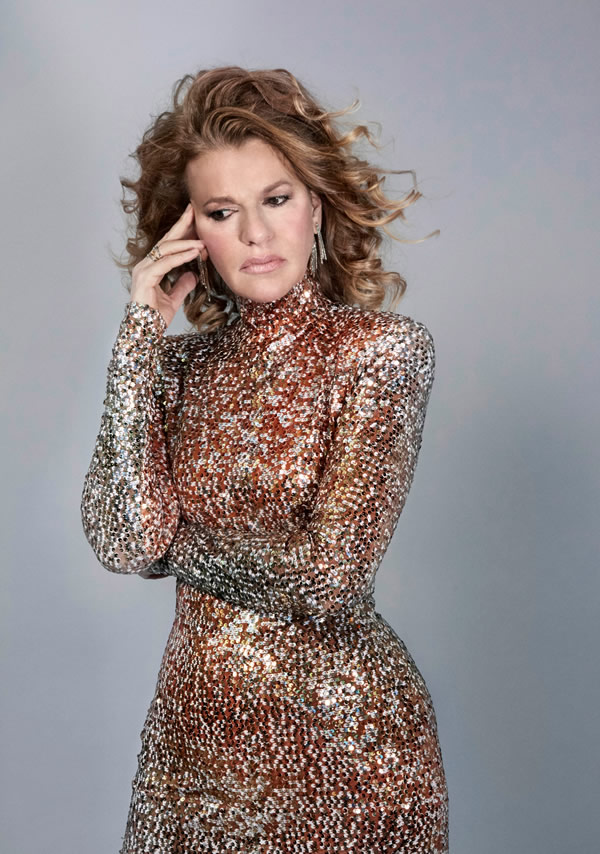
SANDRA BERNHARD says she’s always intrigued by the juxtaposition of life in Washington. (Photo by Jordan Graham)
These are dark days and Sandra Bernhard knows it.
“Are you gender neutral? Come face to face with a white supremacist? Swam through a flood? Run from a fire? Observed a chunk of the polar ice cap floating away? …,” the promos for her show “Sandemonium” read.
If so, well, Sandy is here to help.
She returns to Washington next week with a performance presented by the Washington Blade at Shakespeare Theatre Company. She spoke to the Blade by phone May 18 from her home in New York City. Her comments have been slightly edited for length.
WASHINGTON BLADE: You were just in D.C. recently, weren’t you?
SANDRA BERNHARD: Exactly a week ago, actually.
BLADE: Where did you play?
BERNHARD: I was at the City Winery, a new venue and it was fantastic. It was packed and the audience was terrific. We had a great time. I hadn’t been to D.C. in a while and now I’m excited to come back again. I’ll be doing a lot of different material than I did at the City Winery. All the songs will be different and there’ll be a lot of material I didn’t do at City Winery plus a few little gay Pride surprises.
BLADE: This is your show “Sandemonium,” right?
BERNHARD: Well, that’s just a title, you know. I put a new show together every year at Joe’s Pub so I always have a new title, but essentially I’m always writing new material because of doing my (Sirius XM radio) show “Sandyland” every day, I’m constantly curating new material so it’s nice to keep things really fresh and there’ll be some of that and some newer stuff too. It’s always a work in progress.
BLADE: Are you always listening for songs you’d like to cover or do you keep a list or what?
BERNHARD: Kind of a little bit of both because a lot of times I’ll think my set list is all signed, sealed and delivered and then Mitch Caplan, who’s my musical director, we’ve been collaborating for years, he always laughs because literally a day before I’ll be doing a new show, I’ll find a completely different opening song or a totally different closing song because sometimes the spirit just moves me and then I’m trying to find the absolute right thing that really works so I’m always open to something new even if it’s just an hour before the show.
BLADE: You seem really jaded in your standup at times but yet in interviews you sometimes seem rather joyous and upbeat. Is that just naturally your personality? Is it hard to balance the two extremes?
BERNHARD: It depends on the situation. What’s fun about doing “Sandyland” is I’ve been able to tap into more of my positive side, you know, I think that part of my personality, I just think it registers better on radio and I’ll talk about what’s happening politically or gun violence or things that have a lot of emotion around them. But then day to day, I think I’ve been able to access that part of my personality that people have started coming to day in and day out, so it’s a surprise for me and it’s been a great self discovery.
BLADE: How did your radio show come about?
BERNHARD: I’ve been friendly with Andy Cohen for years and about three years ago, he put his channel Radio Andy together and we had lunch and he said, “I have this idea, I don’t know if you’d be into it, but I’ll be doing this channel on Sirius, I’d love for you to do this show.” I said, “Yeah, that sounds perfect,” because I kind of needed a platform and it’s harder and harder to get a talk show quote-unquote off the ground and they usually just don’t work and radio, especially Sirius, has this sense of freedom that you can’t find anywhere. Never once has anybody walked into my studio and said, “No, don’t say that, don’t do that.” Nobody cares. They just let you do whatever you want because after all, it is home to Howard Stern. How can you be more obnoxious or outrageous than Howard Stern? … It’s just been really cool.
BLADE: What’s the hardest part of doing your stage show that the average person wouldn’t ever think about?
BERNHARD: Well, behind the scenes, there’s just always the logistics. You know, like who’s going to the be the person to get your from point A to point B. I have a few different people who work with me in terms of tour manager and I don’t really go out on the road like Stevie Nicks or some big rock band. I do two or three dates a month and sometimes I’m off the road for two months doing other stuff. … It’s sort of a semi-well-oiled machine but sometimes gig to gig it takes a little more or less effort to make sure it goes smoothly.
BLADE: Speaking of Stevie Nicks, what was it like at the (April, 1998) concert for the “Stormy Weather” album? When you’re doing something like that, are the super A-listers like her, Joni Mitchell and so on, are they polite but kind of stand-offish or what?
BERNHARD: Well I’ve known all those ladies for years and I’ve been really lucky in the course of my career to get to be friendly with a lot of people in the music business. Chrissie Hynde is one of my best friends. I’m friends with Debbie Harry, Belinda Carlisle is one of my best friends and I don’t mean to name drop, but you know, music was really my first love. I wanted to be just a singer and I kind of got sidetracked into comedy and I have no regrets because I think the combination of both has been really very fulfilling for me and fun for the audience. But I know Stevie, I know Joni, I know all those people and you know, I don’t always get to see all of them all the time, but in that setting, of course, I’m a little bit intimidated because they’re the best at what they do. I consider myself a decent singer and pretty decent musical person but, you know, I always defer to those people. But they’re always totally supportive and lovely and most people think I have a pretty good voice, so I take that as a nice compliment obviously.
BLADE: Is there anybody of that ilk who is privately much different from their public persona? Maybe somebody who’s actually raunchy or shy or something we’d never guess?
BERNHARD: (laughs) No, nobody’s really raunchy. I think Belinda Carlisle is probably one of the most humble and shy people and so is Debbie Harry. Everybody who is really, really good, they play down what they do in their day-to-day life and almost all of them do something that is very grounding and they’re involved with a lot of different social causes so I don’t know — I just think people who are really talented are usually very complex and interesting and not full of themselves.
BLADE: Was it kind of trippy and surreal to see the “Roseanne” set so faithfully recreated for the reboot?
BERNHARD: Um, yes it was and yet also in a way not because it just sort of felt like, well, it’s not that shocking that it happened again because it was so iconic and it’s been on the air every single day since it went off the air, you know, officially. It’s been in rotation for 20 years so I think it was different than it would have been if it was a show we hadn’t seen at all in 30 or 40 years, then it would have been more weird. So it was and it wasn’t.
BLADE: Does it feel much different on the set this time?
BERNHARD: It feels a little different. There’s new kids and new writers but generally speaking, you know, Laurie Metcalf and all the main people, John Goodman, it has that continuity so it didn’t feel that much different. I think people have all evolved a lot emotionally and spiritually so I think things are a little more relaxed than they were maybe early on.
BLADE: What’s Roseanne like between takes? Is she high strung or kind of chill?
BERNHARD: She’s pretty chill. She gets tired out pretty easily you know. She’s not like a hard-charging person so I think sometimes she just needs to like, escape and regroup a little and she’ll kind of keep to herself, but you know, when she’s around, she’s friendly, she’s nice to everybody.
BLADE: How did you first hear of the reboot and are you going to be in more of it or do you know yet?
BERNHARD: Well, I sort of read about it like everybody else to be perfectly honest with you. And then I reached out to Sara Gilbert who was sort or rebooting the whole project and then I didn’t hear back from her for quite a while and then all of a sudden out of the clear blue, I did hear back from her and that’s sort of when it all came together for the last episode. It was the last episode they shot, even though it just aired a couple weeks ago. I’m sure they’ll have me back at least one or two more times during the next go-around, but they haven’t committed to anything yet. (Bernhard’s Blade interview occurred prior to the news this week that the “Roseanne” reboot was cancelled.)
BLADE: Now that it’s had a long time to sink in, what impact do you think your (lesbian/bi) storyline and the kiss and all that had culturally? Do you think it reached more people because of “Roseanne’s” demographic?
BERNHARD: Yeah, I think it reached everybody because the average weekly viewership of the show in its prime was 15-20 million … so I think it had a huge impact and opened the doors for a lot of different conversations about sexuality and, you know, certainly it’s gone to places nobody could have imagined and that’s a cool thing.
BLADE: Does Roseanne’s Trump support bother you, either on the show or in real life?
BERNHARD: I’m not happy about it. I think if it was strictly Roseanne the character, it would have been understandable but even then, not really because Roseanne and Dan were always liberals and he was a union guy and so none of it really makes sense at all and I think when they come back, I think it’s probably less political. I just read an article and the president of ABC, who’s a woman of color, she was saying, “No, it’s not gonna be this way next time around.” Because what’s the point of it? I mean, oh, to show people that Muslims are people too? Do we really need that primer in 2018? Really? I would hope people are smart enough and open enough to know that there are people in every path of life that are good and bad. I mean, how many more conversations do we need to have about this shit? I just don’t think it really resonates to me and I don’t think it resonates with anybody because I would hope people are intelligent enough to figure that out on their own.
BLADE: I heard Carol Burnett say recently that shows take way longer to tape than they did back in the ’60s and ‘70s. She was saying on her show, it was zip-zip-zip, they’d be done in a few hours and go home, now it’s like a 10-hour ordeal when she guests on something. How long is a normal day when you’re taping something?
BERNHARD: They’re all totally different. If it’s a four-camera show, which “Roseanne” is, in other words, you’re shooting in front of a live audience, it’s really like preparing a little play every week and it can be a Wednesday or a Monday, it depends on the shoot. But you start with a table reading and work out sort of like what needs to get changed out initially. Then you go to the set, you do a run through and then as the week progresses you do more and more rehearsals and you start blocking and the longest day on “Roseanne” is the shoot day. You usually get there by 11 or 12 and they start shooting by 6 and you’re kind of done by 8 or 9. Roseanne doesn’t like to be around for hours and hours, nobody does. If you’re shooting single camera, that’s a whole different ball game because you can be there for 12-14 hours because you’re setting up every shot and it’s a much more frustrating experience.
BLADE: You’ve been on so many shows — “DTLA,” “Brooklyn Nine-Nine,” “2 Broke Girls.” Are there any you felt had more life in them or you wish would have really taken off?
BERNHARD: Well I certainly would have liked more “Brooklyn Nine-Nine” because it was really fun playing Chelsea Peretti’s mom and I think she was a fun, blowsy, kooky character but now that they’ve been picked up by NBC, maybe I’ll get a chance to reprise the role. “2 Broke Girls” was great because they had a five-episode arc and I got to fulfill that character’s sort of destiny on that show. I should also tell you that this coming Monday and Tuesday I’m shooting a role on the new show “Pose,” the new Ryan Murphy show so I’m really excited about that. I’m playing a nurse in an AIDS ward in 1986 or ’88 and, you know, having lost a lot of friends during the AIDS crisis and having visited many friends in hospitals, it’s sort of a fitting role that I get to play opposite Billy Porter who’s a terrific actor and supposedly it’s a recurring role. So I’m really excited. It’s the first time I’ve done a Ryan Murphy project so I’m excited about it.
BLADE: I know you have a few things in development yourself. Is it any harder or easier to get a green light in Hollywood than it was, say, 20 years ago?
BERNHARD: It’s about the same. I mean there’s certainly more outlets for things. I have a couple of scripted projects but now two of the shows are back on hold again but one of them jumped ahead of the pack and I have a very well-known producer involved with it so it seems to be progressing and hopefully at some point this summer I’ll be pitching it to some of the different outlets. I’m keeping my fingers crossed. This is a little broader, kind of comedy than I’m normally, you know, thought of, so I’m kind of excited about that because I think it’s very accessible but still cutting edge and funny so we’ll see.
BLADE: What’s your favorite venue for your live show?
BERNHARD: Well I’d have to say Joe’s Pub. It’s my incubator for new material and I’ve done shows there now for well over 10 years. I’ve kind of lost track. People just come there, it’s intimate and it’s just the right setting for doing something new and people are very, you know, supportive and it just creates a vibe. I always do it the day after Christmas to New Year’s Eve and it kind of sets the tone for the end of the year and the beginning of the year. … It’s nice to have a little launching pad for everything.
BLADE: You don’t mind working that time of year? Most people like to lay low that week.
BERNHARD: No, I prefer it actually. I don’t love sitting around during the holidays and I certainly wouldn’t want to travel at that time. It’s crazy. I’d rather be on stage performing and engaged, then when it’s done, that’s when I like to go away when everybody else is going back to school and work.
BLADE: How are (partner) Sara and (daughter) Cicely?
BERNHARD: They’re great, terrific. They’re both super busy. Sara is doing a project for a magazine called Fast Company and Cicely just got home from college. She’s going to be doing an internship and working and volunteering this summer so everybody is fully engaged.
BLADE: Did you give up Kabbalah?
BERNHARD: No, but I do it on my own. I don’t go there to the center anymore. I go to a synagogue here in New York where there’s a very cool young rabbi and his wife and it’s just much less crazy. The scene there is more chill.
BLADE: I’ve heard you say you like the more traditional prayers and songs and such. I’m just wondering because it’s the same thing in Christianity — I want the progressive, gay-friendly churches and it’s great, but the music and prayers suck.
BERNHARD: I grew up conservative. It’s truly a crap shoot. I found this one place here in New York that’s totally LGBT friendly and even though it’s not a gay synagogue, there are a lot of gay people. … It’s a great mix and the kind of people I grew up with … so it reminds me of my family and there’s all these groovy young people and gay people and it’s very fulfilling to see everybody getting along and nobody judging anybody. That’s how I think the world should be. I don’t think people should just have to be with their own people all the time. I think we should all be able to be together and embrace the difference and have fun together.
BLADE: I sense you may be more of a traditionalist than people would guess. Are you?
BERNHARD: I like continuity in my life and day to day, I like things that are sort of mundane in a way, things that are familiar. I guess that’s why I embrace certain aspects of my religion. It’s just sort of the way I roll in life.
BLADE: Do you make it a point to put yourself out there more than you might otherwise be inclined to generate stuff you can use in your comedy?
BERNHARD: No, that happens naturally. There’s no way you could put yourself in a situation hoping something comes out of it because nothing ever does. It’s always when you least expect it. Literally shit happens when I’m in the grocery store or I’m trying to get a taxi or just my reaction to things in conversations with Sara, she’s really funny. We’ll sort of riff off each other and I’ll run to my notes and write things down. It just flows naturally.
BLADE: Have you ever been invited to be a guest judge on “RuPaul’s Drag Race”?
BERNHARD: No, I have not darling and I know RuPaul from the day. I don’t know why Miss RuPaul’s so shady with me ‘cause I was on RuPaul’s show on VH1 Hanukkah special and now Ru gets so shady with me and I don’t know why ‘cause I’ve never had any problem with Ru. I think I should have been one of the first judges because listen, “Without You I’m Nothing,” the film, all my background singers are drag queens. I embraced the drag world when I was like 19 years old. … I was hip to the drag world in the ‘70s when I was very, very young, so for me it’s sort of a natural but what the fuck? But whatever. I was a groundbreaking supporter of drag and every other kind of interesting gay, you know, anomaly, so I don’t have anything to worry about.
BLADE: What did you think of Michelle Wolf’s bit at the Correspondents’ Dinner?
BERNHARD: I thought it was brilliant. I thought she worked her ass off. It was A-list material. It was fucking brilliant. She went for broke and I thought her whole approach to taking down, you know, the journalists on both sides was brilliant and I thought what she said about smoky eye was fucking genius. She wasn’t trashing (Sarah Huckabee Sanders) for her looks, she was just saying how brilliant that she takes the ashes of lies and makes a smoky eye. How anybody could have interpreted that as saying she was ugly — no, you’re hearing that because is ugly is what’s going on inside the White House and it’s a reflection of people who don’t want to fucking face it. And the moral bankruptcy of this country and this particular moment and people don’t want to hear about it, even on the left, even that the Democrats have not fucking, you know, been able to squelch this thing as well, they should have a certain culpability in it. And that’s just the reality. So yeah, she fucking blew the roof off the joint.
BLADE: Do you enjoy doing “The Wendy Williams Show”?
BERNHARD: I love doing Wendy’s show. She’s always great, she loves me, she’s supportive, she’s fun, she’s not intrusive. I do it, I kiss her, we’re done and she’s totally cool.
BLADE: How do you stay so thin? Do you work at it or does it come naturally?
BERNHARD: Well I’m naturally skinny and then as I’ve aged, and once I had Cicely my body shifted a little bit. Now I gotta work on it but I think like Catherine Deneuve says, at a certain point you gotta keep an extra 10 pounds on your ass to make sure your face looks good and that’s the truth. … I’m 5’10” so that just makes a big difference in how the weight falls and I’ve just been lucky but yeah, of course I’m not as skinny and trim as when, you know, I was 25-30 or even 40 but I still think I look pretty good and I take excellent care of myself.
BLADE: Do you have jokes that are like your greatest hits people expect to hear?
BERNHARD: There’s a few lines. Like my Mom’s line about there must have been dust on those mints, I think that’s the one that’s most recognizable and it’s a great honor for my Mom. She passed away four years ago and she always got a kick out of that.
BLADE: How do you keep track of all your material?
BERNHARD: Most of it is printed out. I have, like, these folders of different shows I’ve done. Some are in storage in L.A., some are in script form like “Without You I’m Nothing” or “I’m Still Here, Damn It!” The shows that were more theatrical are in script form. But then shows where I’m more like going all all over the place, they’re written out on pads and I have them in various folders jammed into my closet.
BLADE: It seems like you have a nice level of fame where you can still go out to dinner and go shopping and not be hounded to death. Are people ever obnoxious when they recognize you?
BERNHARD: No, almost never. Sometimes they want to talk a little bit or say hi and take a quick picture but people are very cool with it. I’m always flattered when they say nice things. I ride the subway and feel very protected and safe maneuvering around and getting to do what I want to do. I’m really glad my life is like that.
BLADE: This isn’t really a question but whenever I see “Truth or Dare” and that dancer, I think Oliver, is fumbling with your name, I just want to scream, “It’s Bernhard — it’s not that hard.”
BERNHARD: Well, you know, it was probably just his way of pulling focus and getting a little extra attention in that huge miasma of ego that everybody was, you know, floating around in. I hope he’s OK. I’m sure he hasn’t been able to sustain that.
BLADE: Well, you know they did a reunion movie with all those dancers.
BERNHARD: Yeah, I know. I need to see that. I read about it but I didn’t see it yet.
BLADE: Are you a clotheshorse?
BERNHARD: Well I’m lucky, I get to borrow a lot of things from designers and that’s great because once you’ve worn something and been photographed a lot, you can’t really wear it again anyway so it’s nice to be able to give things back and I always try to give it back in excellent shape. I have a wonderful stylist. We’ve been working together about a year and a half, Scott Allgauer, he always pulls me terrific stuff and that’s sort of been a game changer.
BLADE: Is he gay?
BERNHARD: He is!
BLADE: Do you watch much TV yourself? What do you like?
BERNHARD: I always watch “Homeland,” that season just ended. Oh God, you know — it’s so funny, you kind of forget what you watch once it’s off the air. I like “Veep.” I like “The Affair.” I watch “Grace and Frankie” ‘cause I love Lily and Jane. I watched a great show called “Babylon Berlin” that was on Netflix. A German show, very well done. I watch a lot of tennis. I’m a Venus and Serena acolyte.
BLADE: Are you a “Handmaid’s Tale” person?
BERNHARD: I’m not. I literally can’t stomach it. It’s too much for me. It’s so painful and horrifying. I dip in and out but I can’t binge watch it. I did love “Top of the Lake” with Elisabeth Moss, which was great. And I loved “Big Little Lies” on HBO. That was one of my favorite shows last year.
BLADE: Do you have a favorite venue to play in D.C. or do they all sort of run together?
BERNHARD: No, they don’t really run together. I’ve played the Howard a couple times and the George Washington campus. I’ve been playing D.C. since the beginning of my career way back some comedy club that I doubt even exists anymore. But it’s like any town. You get a sense of it but unless you really spend time there, you don’t really know what it’s like. I played the JCC for a month, that was awhile ago. … D.C. is amazing. When you’re in the eye of the storm by the Mall and you see all the monuments, you think, “God, this is amazing.” Then you go out to the suburbs and you’re like, “Where is everything?” It’s kind of a crazy, mixed-up bag there. But I’m looking forward to coming back for Pride.
a&e features
Juliet Hawkins’s music defies conventional categorization
‘Keep an open mind, an open heart, and a willingness to evolve’
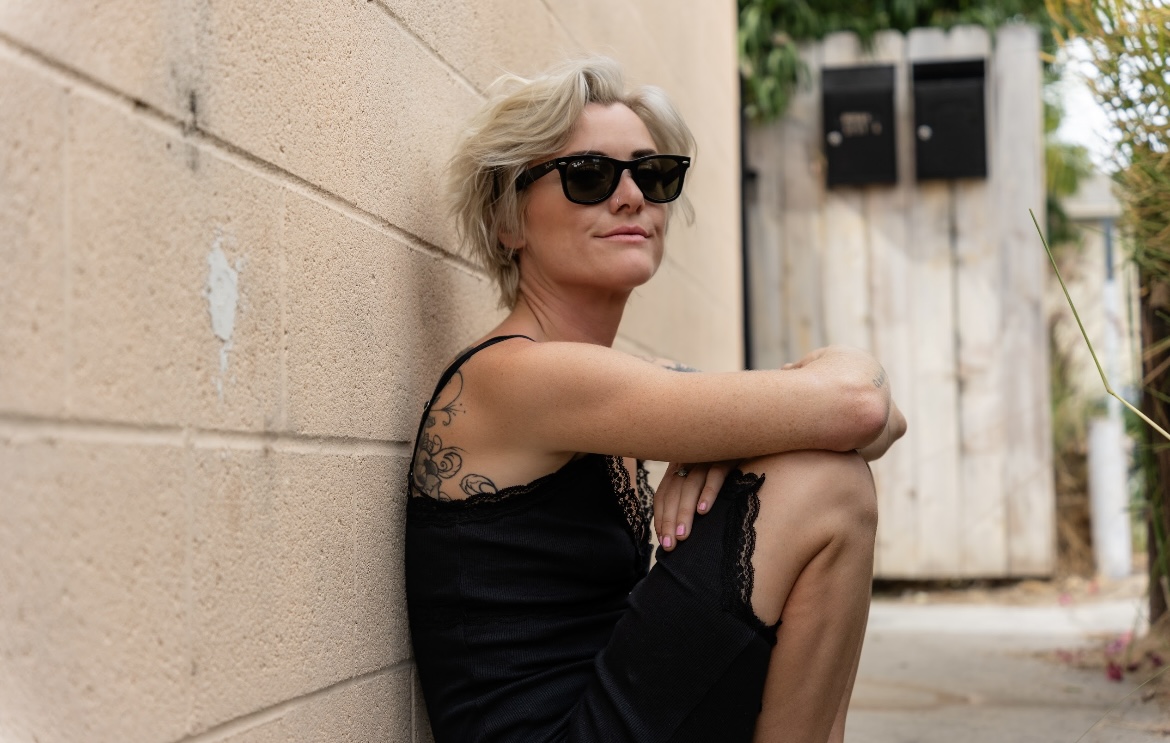
LONG BEACH, Calif. – Emerging from the dynamic music scene of Los Angeles, Juliet Hawkins seamlessly integrates deeply soulful vocals with contemporary production techniques, crafting a distinctive sound that defies conventional categorization.
Drawing inspiration from the emotive depth of Amy Winehouse and weaving together elements of country, blues, and pop, Hawkins’ music can best be described as a fusion–perhaps best termed as soulful electronica. Yet, even this characterization falls short, as Hawkins defines herself as “a blend of a million different inspirations.”
Hawkins’s musical palette mirrors her personae: versatile and eclectic. Any conversation with Hawkins makes this point abundantly clear. She exhibits the archetype of a wild, musical genius while remaining true to her nature-loving, creative spirit. Whether recording in the studio for an album release, performing live in a studio setting, or playing in front of a live audience, Hawkins delivers her music with natural grace.
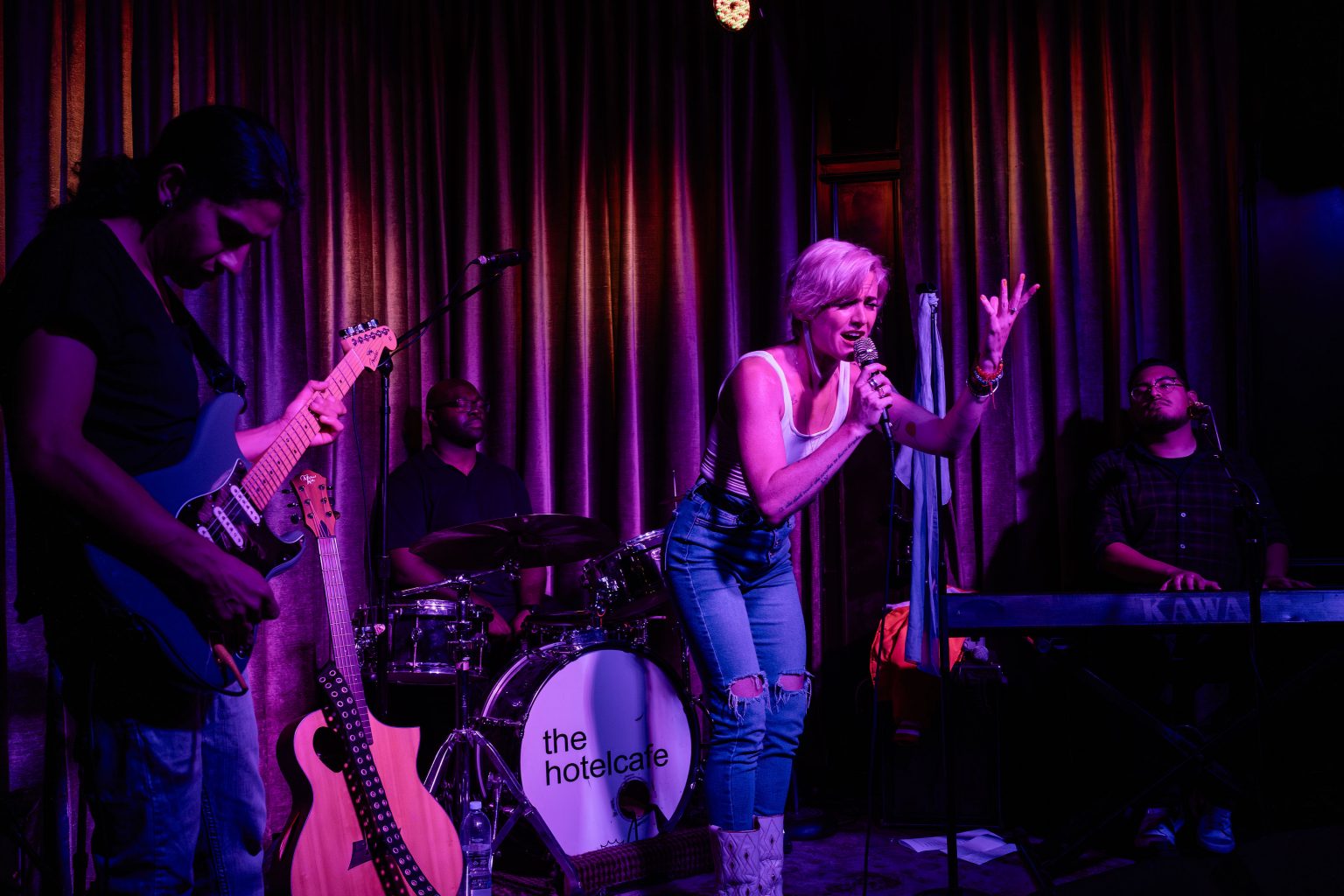
However, Hawkins’s musical journey is far from effortless. Amid personal challenges and adversity, she weaves her personal odyssey of pain and pleasure, transforming these experiences into empowering anthems.
In a candid interview with the Blade, Hawkins spoke with profound openness and vulnerability about her past struggles with opiate and heroin addiction: “That was 10 years ago that I struggled with opiates,” she shared. Yet, instead of letting her previous addiction define her, Hawkins expressed to the Blade that she harbors no shame about her past. “My newer music is much more about empowerment than recovery,” she explained, emphasizing that “writing was the best way to process trauma.”
Despite her struggles with addiction, Hawkins managed to recover. However, she emphasizes that this recovery is deeply intertwined with her spiritual connection to nature. An illustrative instance of Hawkins’ engagement with nature occurred during the COVID pandemic.
Following an impulse that many of us have entertained, she bought a van and chose to live amidst the trees. It was during this period that Hawkins composed the music for her second EP, titled “Lead with Love.”
In many ways, Hawkins deep spiritual connection to nature has been profoundly shaped by her extensive travels. Born in San Diego, spending her formative years in Massachusetts, and later moving to Tennessee before returning to Southern California, she has broadened her interests and exposed herself to the diverse musical landscapes across America.
“Music is the only thing I have left,” Hawkins confides to the Blade, highlighting the integral role that music has in her life. This intimate relationship with music is evident in her sultry and dynamic compositions. Rather than imitating or copying other artists, Hawkins effortlessly integrates sounds from some of her favorite musical influences to create something new. Some of these influences include LP, Lucinda Williams, Lana Del Rey, and, of course, Amy Winehouse, among others.
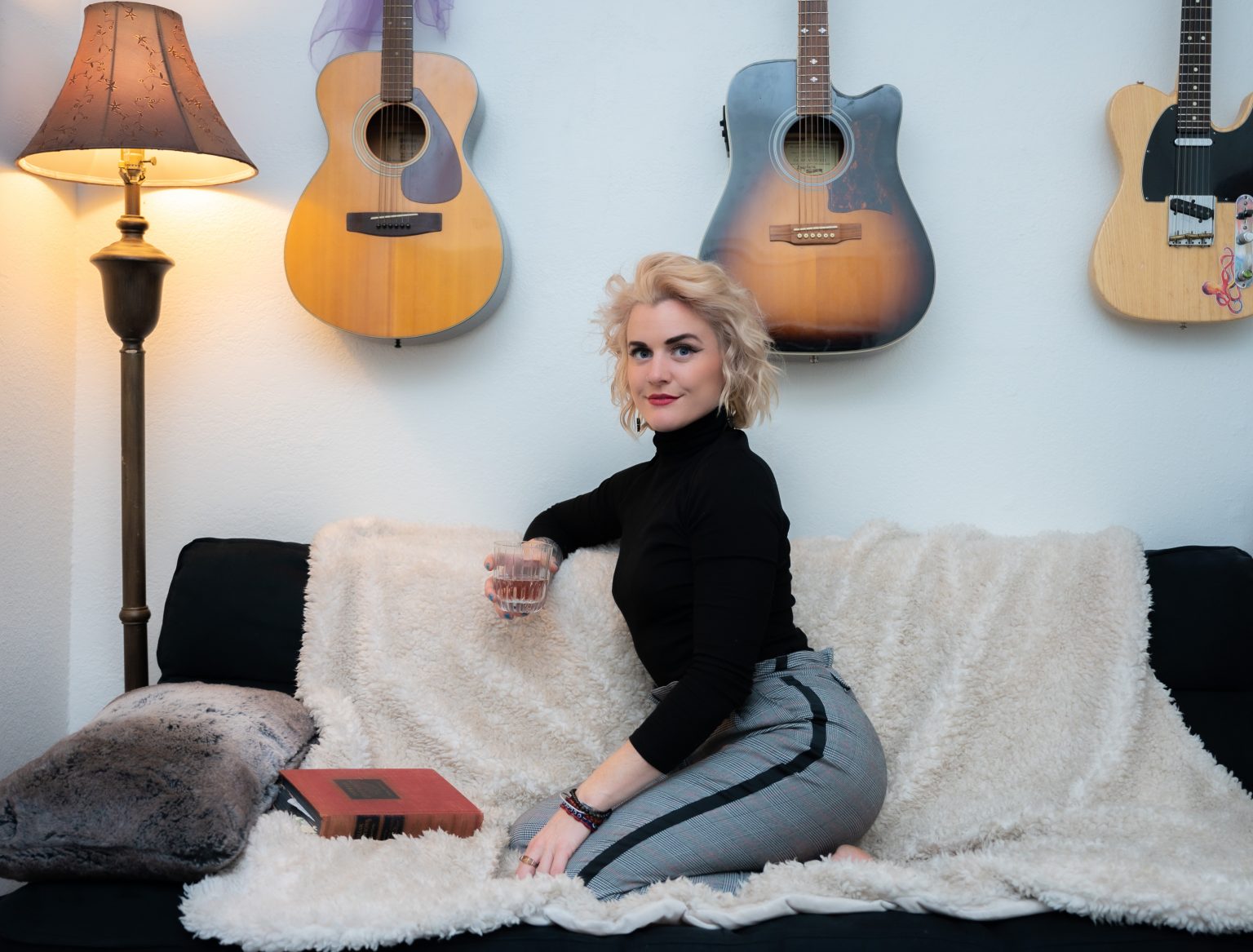
Hawkins has always been passionate about music—-she began with piano at a young age, progressed to guitar, and then to bass, eagerly exploring any instrument she could get her hands on. However, instead of following a traditional path of formalized lessons and structured music theory, Hawkins told the Blade that she “has a hard time following directions and being told what to do.”
This independent approach has led her to experiment with various genres and even join unexpected groups, such as a tribute band for Eric Clapton and Cream. While she acknowledges that her eclectic musical interests might be attributed to ADHD, she holds a different belief: “Creative minds like to move around.”
When discussing her latest musical release — “Stay True (the live album)” which was recorded in a live studio setting — Hawkins describes the experience as a form of improvisation with both herself and the band:
“[The experience] was this divine honey that was flowing through all of us.” She explains that this live album was uncertain in the music’s direction. “For a couple of songs,” Hawkins recalls, “we intuitively closed them out.” By embracing creative spontaneity and refusing to be constrained by fear of mistakes, the live album authentically captures raw sound, complete with background chatter, extended outros, and an extremely somber cover of Ozzy Osbourne’s “Crazy Train” coupled with a slow piano and accompanied strings.
While “Stay True” was a rewarding experience for Hawkins, her favorite live performance took place in an unexpected location—an unattended piano in the middle of an airport. As she began playing Beethoven’s “Moonlight Sonata”, Hawkins shared with the Blade a universal connection we all share with music: “This little girl was dancing as I was playing.”
After the performance, tears welled in Hawkins’ eyes as she was touched by the young girl’s appreciation of her musicianship. Hawkins tells the Blade, “It’s not about playing to an audience—it’s about finding your people.”
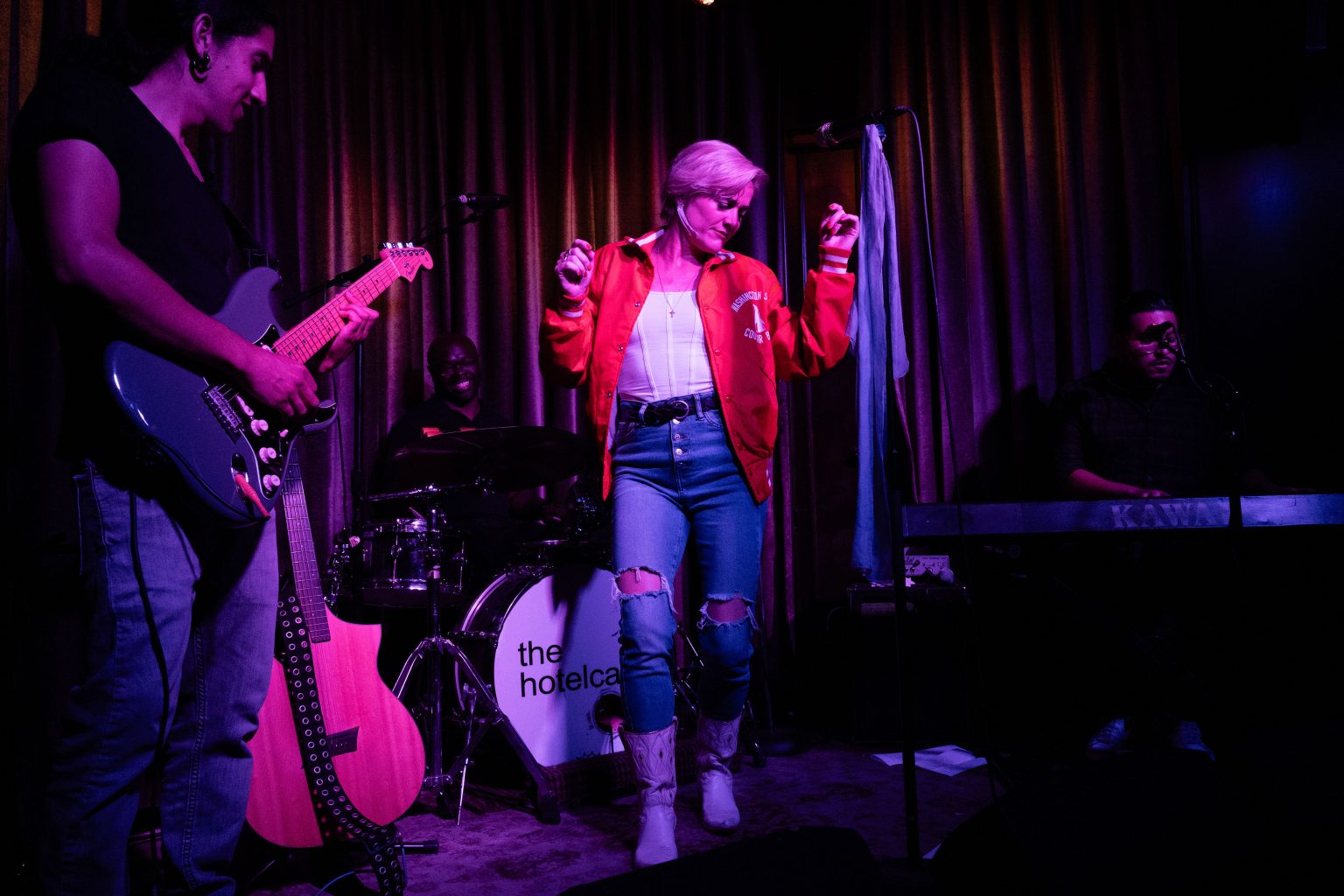
What sets Hawkins apart as an artist is her ability to connect with her audience in diverse settings. She highlights EDC, an electronic dance music festival, as a place where she unabashedly lets her “freak flag” fly and a place to connect with her people. Her affinity for electronic music not only fuels her original pop music creations, but also inspires her to reinterpret songs with an electronic twist. A prime example of this is with her electronic-style cover of Tal Bachman’s 90’s hit, “She’s So High.”
As an openly queer woman in the music industry, Hawkins is on a mission to safeguard artistic integrity. In songs like “My Father’s Men,” she bares her vulnerability and highlights the industry’s misogyny, which often marginalizes gender minorities in their pursuit of artistic expression.
She confides to the Blade, “The industry can be so sexist, misogynist, and oppressive,” and points out that “there are predators in the industry.” Yet, rather than succumbing to apathy, Hawkins is committed to advocating for gender minorities within the music industry.
“Luckily, people are rising up against misogyny, but it’s still there. ‘My Father’s Men’ is a message: It’s time for more people who aren’t just white straight men to have a say.”
Hawkins is also an activist for other causes, with a fervent belief in the preservation of bodily autonomy. Her self-directed music video “I’ll play Daddy,” showcases the joy of embracing one’s body with Hawkins being sensually touched by a plethora of hands. While the song, according to Hawkins, “fell upon deaf ears in the south,” it hasn’t stopped Hawkins from continuing to fight for the causes she believes in. In her interview, Hawkins encapsulated her political stance by quoting an artist she admires:
“To quote Pink, ‘I don’t care about your politics, I care about your kids.’”
When Hawkins isn’t writing music or being a champion for various causes, you might catch her doing the following: camping, rollerblading, painting, teaching music lessons, relaxing with Bernie (her beloved dog), stripping down for artsy photoshoots, or embarking on a quest to find the world’s best hollandaise sauce.
But at the end of the day, Hawkins sums up her main purpose: “To come together with like-minded people and create.”
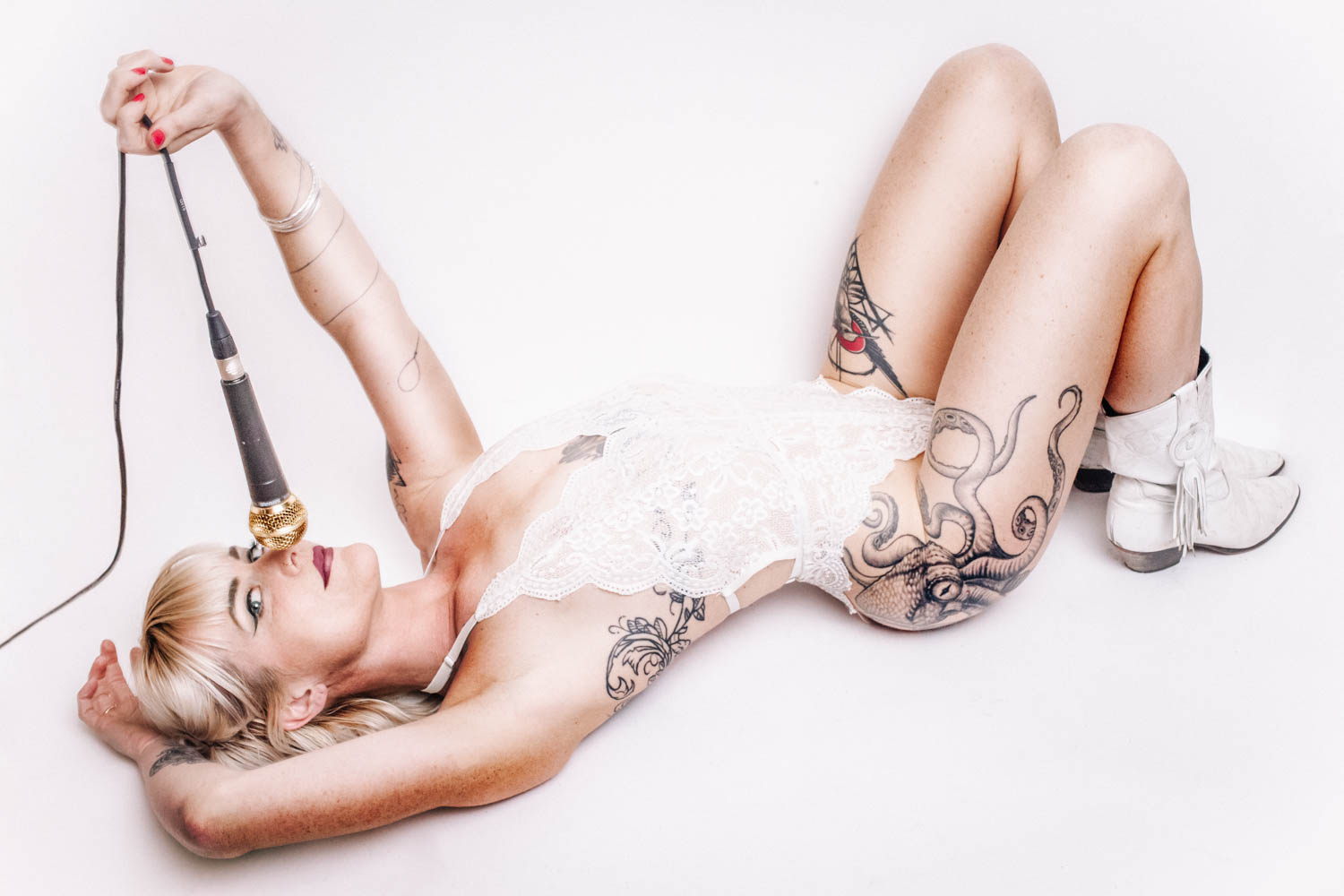
Part of this ever-evolving, coming-of-age-like journey includes an important element: plant-based medicine. Hawkins tells the Blade that she acknowledges her previous experience with addiction and finds certain plants to be useful in her recovery:
“The recovery thing is tricky,” Hawkins explains, “I don’t use opiates—-no powders and no pills—but I am a fan of weed, and I think psilocybin can be helpful when used at the right time.” She emphasizes the role of psychedelics in guiding her towards her purpose. “Thanks for psychedelics, I have a reignited sense of purpose … Music came naturally to me as an outlet to heal.”
While she views the occasional dabbling of psychedelics as a spiritual practice, Hawkins also embraces other rituals, particularly those she performs before and during live shows. “I always carry two rocks with me: a labradorite and a tiger’s eye marble,” she explains.
a&e features
Lavender Mass and the art of serious parody in protest
Part 3 of our series on the history of LGBTQ religion in D.C.
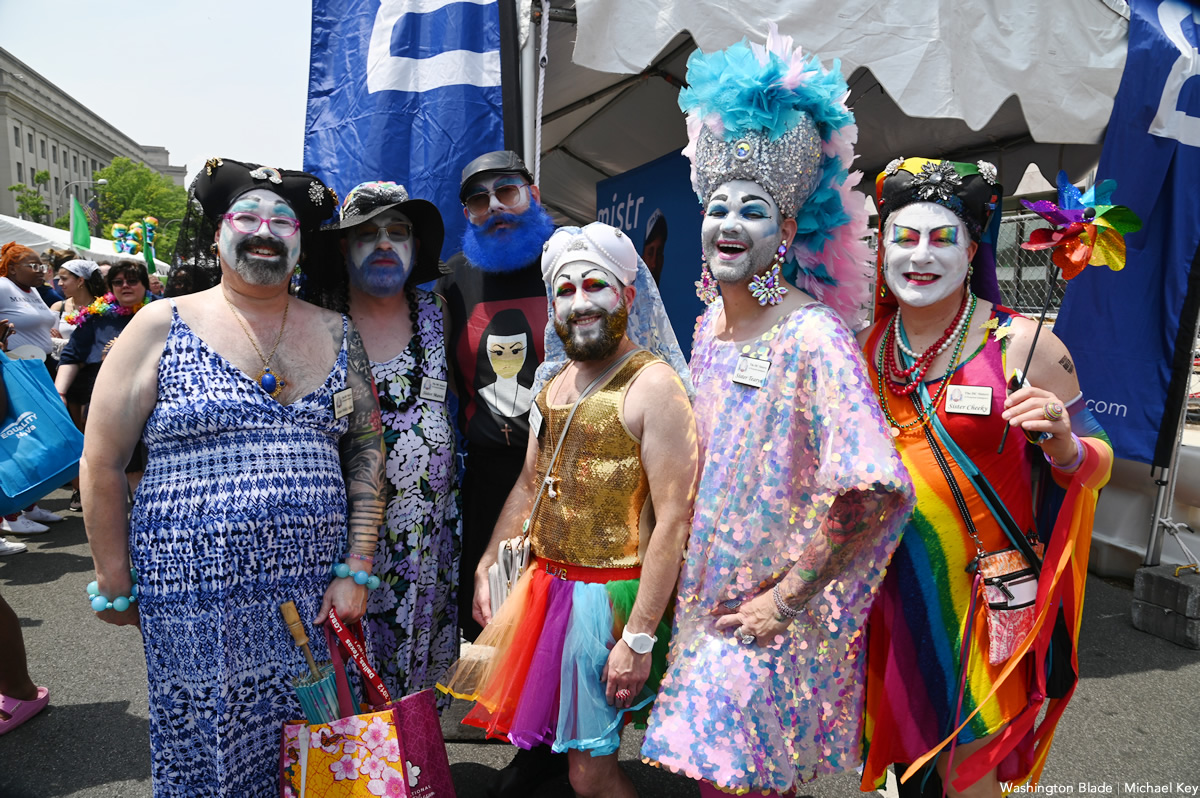
(Editor’s note: Although there has been considerable scholarship focused on LGBTQ community and advocacy in D.C., there is a deficit of scholarship focused on LGBTQ religion in the area. Religion plays an important role in LGBTQ advocacy movements, through queer-affirming ministers and communities, along with queer-phobic churches in the city. This is the final installment of a three-part series exploring the history of religion and LGBTQ advocacy in Washington, D.C. Visit our website for the previous installments.)
Six sisters gathered not so quietly in Marion Park, Washington, D.C. on Saturday, October 8, 2022. As the first sounds of the Women’s March rang out two blocks away at 11 am, the Sisters passed out candles to say Mass on the grass. It was their fifth annual Lavender Mass, but this year’s event in particular told an interesting story of religious reclamation, reimagining a meaningful ritual from an institution that seeks to devalue and oppress queer people.
The D.C. Sisters are a chapter of the Sisters of Perpetual Indulgence, an organization of “drag nuns” ministering to LGBTQ+ and other marginalized communities. What first began as satire on Easter Sunday 1979 when queer men borrowed and wore habits from a production of The Sound of Music became a national organization; the D.C. chapter came about relatively late, receiving approval from the United Nuns Privy Council in April 2016. The D.C. Sisters raise money and contribute to organizations focused on underserved communities in their area, such as Moveable Feast and Trans Lifeline, much like Anglican and Catholic women religious orders.
As Sister Ray Dee O’Active explained, “we tend to say we raise funds, fun, and hell. I love all three. Thousands of dollars for local LGBTQ groups. Pure joy at Pride parades when we greet the next generation of activists. And blatant response to homophobia and transphobia by protest after protest.” The Lavender Mass held on October 8th embodied their response to transphobia both inside and outside pro-choice groups, specifically how the overturn of Roe v. Wade in June 2022 intimately affects members of the LGBTQ+ community.
As a little history about the Mass, Sister Mary Full O’Rage, shown wearing a short red dress and crimson coronet and veil in the photo above developed the Lavender Mass as a “counterpart” or “counter narrative” to the Red Mass, a Catholic Mass held the first Sunday of October in honor Catholics in positions of civil authority, like the Supreme Court Justices. The plan was to celebrate this year’s Lavender Mas on October 1st at the Nuns of the Battlefield Memorial, located right across the street from the Cathedral of St. Matthew the Apostle, where many Supreme Court Justices attend the Red Mass every year.
As Sister Mary explained, this year “it was intended to be a direct protest of the actions of the Supreme Court, in significant measure their overturning of reproductive rights.”
Unfortunately, the October 1st event was canceled due to heavy rain and postponed to October 8th at the recommendation of Sister Ruth Lisque-Hunt and Sister Joy! Totheworld. The focus of the Women’s March this year aligned with the focus of the Lavender Mass—reproductive rights—and this cause, Sister Mary explained, “drove us to plan our Lavender Mass as a true counter-ritual and protest of the Supreme Court of who we expected to attend the Red Mass,” and who were protested in large at the Women’s March.
The “Lavender Mass was something that we could adopt for ourselves,” Sister Mary spoke about past events. The first two Masses took place at the Lutheran Church of the Reformation, right around the corner from the Supreme Court. The second Mass, as Sister Mary explained, celebrated Justice Ruth Bader Ginsburg; “we canonized her.” Canonization of saints in the Catholic Church also takes place during a Mass, a Papal Mass in particular.
During the COVID-19 pandemic, the Sisters moved the Mass outside for safety, and the third and fourth Masses were celebrated at the Nuns of the Battlefield Memorial. “It celebrates nuns, and we are nuns, psycho-clown nuns,” Sister Mary chuckled, “but we are nuns.” After the Mass, the Sisters would gather at a LGBTQ+ safe space or protest at the Catholic Church or Supreme Court. Although they often serve as “sister security” at local events, working to keep queer community members safe according to Sister Amore Fagellare, the Lavender Mass is not widely publicly advertised, out of concern for their own.
On October 8th, nine people gathered on the grass in a circle—six sisters, myself, and two people who were close with professed members—as Sister Mary called us to assemble before leading us all in chanting the chorus to Sister Sledge’s 1979 classic song “We Are Family.”
Next, novice Sister Sybil Liberties set a sacred space, whereby Sister Ruth and Sister Tearyn Upinjustice walked in a circle behind us, unspooling pink and blue ribbons to tie us together as a group. As Sister Sybil explained, “we surround this sacred space in protection and sanctify it with color,” pink for the choice to become a parent and blue for the freedom to choose not to be a parent but also as Sybil elaboration, in recognition of “the broad gender spectrum of people with the ability to become pregnant.” This intentional act was sought to fight transphobia within the fight for reproductive rights.
After singing Lesley Gore’s 1963 song “You Don’t Own Me,” six speakers began the ritual for reproductive rights. Holding out our wax plastic candles, Sister Sybil explained that each speaker would describe a story or reality connected to reproductive rights, and “as I light a series of candles for the different paths we have taken, if you recognize yourself in one of these prayers, I invite you to put your hand over your heart, wherever you are, and know that you are not alone – there is someone else in this gathered community holding their hand over their heart too.”
The Sisters went around the circle lighting a candle for those whose stories include the choice to end a pregnancy; those whose include the unwanted loss of a pregnancy or struggles with fertility; those whose include the choice to give birth, raise or adopt a child; those whose include the choice not to conceive a child, to undergo forced choice, or with no choice at all; those who have encountered violence where there “should have been tenderness and care;” and those whose reproductive stories are still being written today.
After each reading, the group spoke together, “may the beginnings and endings in our stories be held in unconditional love and acceptance,” recalling the Prayer of the Faithful or General Intercessions at Catholic Masswhere congregations respond “Lord, hear our prayer” to each petition. Sister Sybil closed out the ritual as Sister Mary cut the blue and pink ribbons between each person, creating small segments they could take away with them and tie to their garments before walking to the Women’s March. The Sisters gathered their signs, drums, and horns before walking to Folger Park together into the crowd of protestors.
At first glance, the Lavender Mass may appear like religious appropriation, just as the Sisters themselves sometimes look to outsiders. They model themselves after Angelican and Catholic women religious, in dress—they actively refer to their clothing as “habits,” their organization—members must also go through aspirant, postulant, and novice stages to be fully professed and they maintain a hierarchical authority, and in action. Like white and black habits, the Sisters all wear white faces to create a unified image and colorful coronets, varying veil color based on professed stage. Sister Allie Lewya explained at their September 2022 meeting, “something about the veils gives us a lot of authority that is undue,” but as the Sisters reinforced at the Women’s March, they are not cosplayers nor customers, rather committed clergy.
As such, the Sisters see their existence within the liminal spaces between satire, appropriation, and reimagination, instead reclaiming the basis of religious rituals to counter the power holders of this tradition, namely, to counter the Catholic Church and how it celebrates those in positions of authority who restrict reproductive rights. Similarly, the Lavender Mass is modeled after a Catholic or Anglican Mass. It has an intention, namely reproductive rights, a call to assemble, setting of a sacred space, song, chant, and prayer requests. It even uses religious terminology; each section of the Mass is ended with a “may it be/Amen/Awen/Ashay/aho.”
While this ritual—the Lavender Mass—appropriates a religious ritual of the Catholic Church and Anglican Church, this religious appropriation is necessitated by exclusion and queerphobia. As David Ford explains in Queer Psychology, many queer individuals retain a strong connection to their faith communities even though they have experienced trauma from these same communities. Jodi O’Brien builds on this, characterizing Christian religious institutions as spaces of personal meaning making and oppression. This essay further argues that the fact this ritual is adopted and reimagined by a community that the dominant ritual holder—the Catholic Church—oppressed and marginalized, means that it is not religious appropriation at all.
Religious appropriation, as highlighted in Liz Bucar’s recent book, Stealing My Religion (2022), is the acquisition or use of religious traditions, rituals, or objects without a full understanding of the community for which they hold meaning. The Sisters, however, fully understand the implications of calling themselves sisters and the connotations of performing a ritual they call a “Mass” as women religious, a group that do not have this authority in the Catholic Church. It is the reclamation of a tradition that the Sisters of Perpetual Indulgence understand because some were or are part of the Catholic Church.
Some sisters still seek out spiritual meaning, but all also recognize that the Catholic Church itself is an institution that hinders their sisters’ access and actively spreads homophobia and transphobia to this day. As such, through the Lavender Mass, the sisters have reclaimed the Mass as a tool of rebellion in support of queer identity.
Just as the Sisters recognize the meaning and power of the ritual of a Mass, along with the connotations of being a sister, the Lavender Mass fulfilled its purpose as a ritual of intention just as the Sisters fulfill public servants. “As a sister,” Sister Ruth dissected, “as someone who identifies as a drag nun, it perplexes people, but when you get the nitty gritty, we serve a similar purpose, to heal a community, to provide support to a community, to love a community that has not been loved historically in the ways that it should be loved.
The Sisters’ intentionality in recognizing and upholding the role of a woman religious in their work has been well documented as a serious parody for the intention of queer activism by Melissa Wilcox. The Lavender Mass is a form of serious parody, as Wilcox posits in the book: Queer Nuns: Religion, Activism, and Serious Parody(2018). The Mass both challenges the queerphobia of the Catholic Church while also reinforcing the legitimacy of this ritual as a Mass. The Sisters argue that although they would traditionally be excluded from religious leadership in the Catholic Church, they can perform a Mass. In doing so, they challenge the role that women religious play in the Catholic Church as a whole and the power dynamics that exclude queer communities from living authentically within the Church.
By reclaiming a tradition from a religious institution that actively excludes and traumatizes the LGBTQ+ community, the Lavender Mass is a form of religious reclamation in which an oppressed community cultivates queer religious meaning, reclaims a tradition from which they are excluded, and uses it to fuel queer activism (the fight for reproductive rights). This essay argues that the Lavender Mass goes one step further than serious parody. While the Sisters employ serious parody in their religious and activist roles, the Lavender Mass is the active reclamation of a religious tradition for both spiritual and activist ends.
Using the celebration of the Mass as it was intended, just within a different lens for a different purpose, this essay argues, is religious reclamation. As a collection of Austrian and Aotearoan scholars explored most recently in a chapter on acculturation and decolonization, reclamation is associated with the reassertion and ownership of tangibles: of rituals, traditions, objects, and land. The meaning of the Lavender Mass comes not only from the Sisters’ understanding of women religious as a social and religious role but rather from the reclamation of a physical ritual—a Mass—that has specific religious or spiritual meaning for the Sisters.
When asked why it was important to call this ritual a “Mass,” Sister Mary explained: “I think we wanted to have something that denoted a ritual, that was for those who know, that the name signifies that it was a counter-protest. And you know, many of the sisters grew up with faith, not all of them Catholics but some, so I think ‘Mass’ was a name that resonated for many of us.”
As Sister Ray said, “my faith as a queer person tends to ostracize me but the Sisters bring the imagery and language of faith right into the middle of the LGBTQ world.” This Lavender Mass, although only attended and experienced by a few of the Women’s March protests, lived up to its goal as “a form of protest that is hopefully very loud,” as Sister Millie Taint advertised in the Sisters’ September 2022 chapter meeting. It brought religious imagery and language of faith to a march for reproductive rights, using a recognized model of ritual to empower protestors.
The Lavender Mass this year, as always, was an act of rebellion, but by situating itself before the Women’s March and focusing its intention for reproductive rights, the Sisters’ reclaimed a religious ritual from a system of authority which actively oppressed LGBTQ+ peoples and those with the ability to become pregnant, namely the Catholic Church, and for harnessing it for personal, political, and spiritual power. In essence, it modelled a system of religious reclamation, by which a marginalized community takes up a religious ritual to make its own meaning and oppose the religious institution that seeks to exclude the community from ritual participation.
Emma Cieslik will be presenting on LGBTQ+ Religion in the Capital at the DC History Conference on Friday, April 6th. She is working with a DC History Fellow to establish a roundtable committed to recording and preserving this vital history. If you have any information about these histories, please reach out to Emma Cieslik at [email protected] or the Rainbow History Project at [email protected].
a&e features
Conflict and profound loss: the AIDS epidemic and religious protest
Part 2 of our series on the history of LGBTQ religion in D.C.
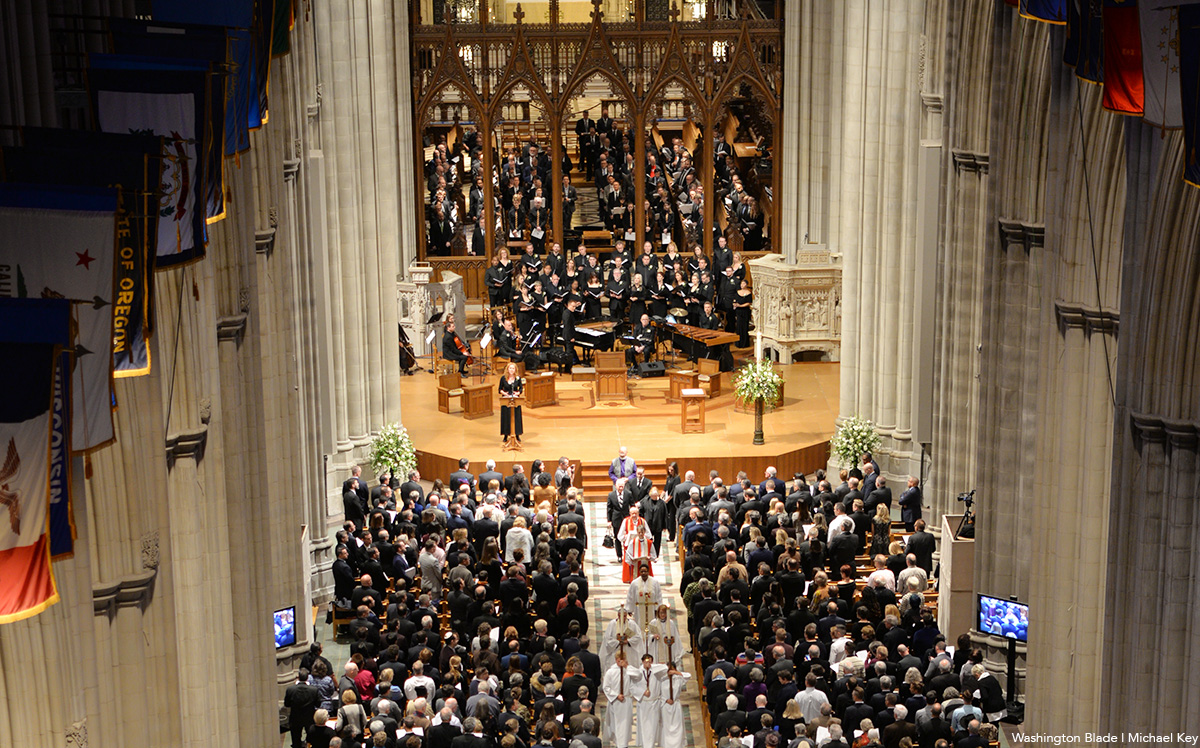
(Editor’s note: Although there has been considerable scholarship focused on LGBTQ community and advocacy in D.C., there is a deficit of scholarship focused on LGBTQ religion in the area. Religion plays an important role in LGBTQ advocacy movements, through queer-affirming ministers and communities, along with queer-phobic churches in the city. This is part two of a three-part series exploring the history of religion and LGBTQ advocacy in Washington, D.C.)
The Gay Liberation Front of DC previously organized a Gay Pride Week in 1972, by the efforts of Chuck Hall, Bruce Pennington, and Cade Ware. Deacon Maccubbin was still perplexed how Washington, D.C., which had a diverse gay scene, albeit a segregated one, did not have a large festival to gather together like that in New York. Together with former Gay Activists Alliance president Bob Carpenter, Maccubbin set out to plan a Pride event specific to the city, and on June 22, 1975, “Gay Pride Day” was the first officially recognized Pride celebration in D.C. The first Gay Pride Day was scheduled one week in advance of the Christopher Street Liberation Day parade in New York City so that LGBTQ D.C. residents could participate in that parade alongside others along the East Coast.
One year later, the timing sparked controversy because Gay Pride Day fell on June 20, also Father’s Day. John Wilson’s opponent in the Democratic primary election spoke out against Wilson’s support of holding Pride Day on the 20th. His opponent argued that Wilson was “an embarrassment to the city for introducing a Council resolution allowing Gay Pride Day to fall on Father’s Day.” Similarly William Stahr of Baltimore shared in a column in The Washington Star that the Council decision “is outrageously anti-social because the encouragement of homosexuality weakens society by undermining the family.”
LGBTQ community representative David L. Aiken wrote a letter back to the editor of The Washington Star on June 18, 1976 explaining the community’s decision.
“Gays do not threaten fatherhood, motherhood, or any other traditional values. Many people who are fathers or mothers have a realization that there is another side to their personality that can be expressed through gay love. The two are not mutually exclusive. What gay pride does challenge, however, is the bigoted assumption that heterosexual relations are the only kind about which it is polite to speak.”
Many Catholic priests in the area were upset that it fell on Father’s Day as well, which is celebrated in American Catholic churches with a special Mass that day, but the organizer of the second annual Gay Pride Day, Frank Akers, then a staff member at the Washington Blade, reported that the 1976 Gay Pride Day “was a success spiritually, if not financially.”
But the success of the 1976 Gay Pride Day was followed shortly after by the start of the HIV/AIDS pandemic. In the late 1970s, the HIV strain arrived in the United States and men who had sex with men were disproportionately affected. While LGBTQ individuals still faced intense persecution in secular and some religious spaces, the visibility of religiously motivated homophobia only grew and grew as conservative religious leaders like Anita Bryant and Jerry Falwell argued that HIV/AIDS was God’s punishment for the “promiscuity” of LGBTQ individuals. He made this especially clear in a discussion with MCC founder Troy Perry on July 6, 1983. Like many major cities, Washington, D.C. was hit hard but affirming organizations worked to provide care for LGBTQ people.
In 1982, D.C.’s MCC partnered with the Whitman-Walker Clinic, the NIH, MCC Baltimore, and Georgetown University Hospital to host one of the first AIDS forums in the nation (the event was held at the church). At a time when people were still weary of contact with HIV-positive individuals, water baptism was held by Faith Temple at Calvary Baptist Church in D.C. in 1986. This occurred at a time when many churches were not baptizing persons known or thought to be HIV positive or had AIDS. On Oct. 12, 1991, the NAMES Project Chapter and the Clergy Commission on AIDS coordinated the display of pieces of the AIDS Memorial Quilt at DMV churches, from St. Augustine Catholic Church to New Bethel Baptist Church to the National Cathedral.
The National Cathedral first began its ministry around HIV/AIDS in 1986, hosting a conference that same year to address how religion and religious communities can serve as allies and caregivers. The National Cathedral also displayed the quilt and organized services around the memorial in 1988, the year of the national tour of the Quilt, as well as in 1990, 1993, 1994, and 1996. Most recently, The Washington Cathedral also hosted the AIDS Memorial Quilt in July 2012, on the quilt’s 25th anniversary. From July 17-26, the Cathedral honored all those who died from AIDS and individuals who are living with HIV/AIDS. Dr. James Curran spoke during the interfaith memorial service at the Cathedral on Saturday, July 21.
However, at the same time, the Dignity chapter meeting at Georgetown University was forced to move to St. Margaret Episcopal Church after the Vatican released a letter by Cardinal Joseph Ratzinger claiming that LGBTQ individuals are “objectively disordered” in October 1986. Social and violent homophobia continued into the early 1990s, especially as focus on family rights were conflated with anti-LGBTQ legislation in the late 1980s. Another resurgence of family rights would occur in the late 2010s and early 2020s with the election of Donald Trump as president in 2016.
By the late 1990s and early 2000s, many more congregations were moving to become open and affirming. On Dec. 11, 2001, Bruce Pennington moderated a panel discussion “Creating Communities of Faith” featuring Faisal Alam, Jerry Goldberg, Andrew Hudson, Bob Miailovich, Dan Schellhorn, and Michael Vanzan. Ten years later, the DC Metropolitan Community Church celebrated 40 years of service to LGBTQ Washingtonians. As one of the first Metropolitan Community Churches in the DMV area, DC’s MCC was instrumental in founding the New Life MCC of Hampton Rocks, Norfolk, Va., in 1977, MCC of Northern Virginia, Oakton, Va., in 1981, Open Door MCC in Boyds, Md., in 1982, and Holy Redeemer MCC College Park, Md., in 1998.
That same year in 2011, Dignity/Washington hosted the National Convention of Dignity USA in D.C., during which four long-term Dignity couples from across the country were married by Dignity/Washington members under the new DC marriage equality laws. A number of other congregations also became actively involved in Capital Pride events, including the Cleveland Park UCC, First Congregational UCC, and Westmoreland UCC. The three groups hosted a UCC welcome book with other churches every year at the Capital Pride Festival up until the COVID-19 pandemic.
At the same time, new religious communities developed. Wiccan, neo-pagan, and pagan communities have long been spiritual refugees for LGBTQ communities, and pagan faith communities were first established in the DMV in the early 2010s. Also in 2011, Circle Sanctuary Ministers Jeanet and David Ewing founded the Potomac Circle Ministries in Northern Virginia to minister to pagans in the DMV area. In March 2013, Circle Sanctuary founder Rev. Selena Fox and other Circle Ministers attended the Marriage Equality rally in front of the U.S. Supreme Court, and she participated in the interfaith service at the Lutheran Church of the Reformation in Washington, DC. In November 2013, Jeanet and David Ewing performed a same-sex wedding in front of the Supreme Court in Washington, D.C.
What followed was a year of interfaith LGBTQ ministry in the DC area, which is celebrated every June with a Pride Interfaith Service held at a different DC worship space. The service is coordinated by DC Center Faith, the successor to the Celebration of the Spirit Coalition and the Washington Area Gay/Lesbian Interfaith Alliance which have been hosting interfaith services since 1983. In fact, much of the history of DC’s LGBTQ+ religious communities was recorded in November 2014 at an event organized by Center Faith called “Stepping Out” hosted at the Westminster Presbyterian Church, SW, D.C.
Center Faith partnered and still partners with Jewish, Christian, Muslim, Hindu, Sikh, Buddist, Unitarian universalist, Centers for Spiritual Living, Pagan, Wiccan, and Earth Religions faith communities who are supportive and inclusive of LGBTQ individuals. Through Center Faith, local faith leaders made strong connections through which they would gather and protest for LGBTQ rights. For example, faith leaders gathered together in front of the Supreme Court on Oct. 8, 2019 for the MoveOn Rally right as the Supreme Court heard a case that would overturn LGBTQ individuals’ right to work and allow employers to fire someone because they were LGBTQ.
Later into the 2010s, LGBTQ organizations exploring religion and humor came to be part of the D.C. area. The DC House of the Sisters of Perpetual Indulgence, “The Abbey of Magnificent Intentions” was approved by the United Nuns Privy Council in April 2016. Just as Deacon Maccubbin and David L. Aiken had done 30 years earlier, fighting back against conservative religious pushback to holding the Gay Pride Day on Father’s Day in 1976, the DC Sisters of Perpetual Indulgence came together on Oct. 8, 2022 to hold their fifth annual Lavender Mass — a counter event to the Red Mass. The Red Mass is a Catholic Mass held on the first Sunday of October to honor Catholics in positions of civil authority, like the Supreme Court Justices.
That Lavender Mass took place right before the March for Reproductive Rights following the overturn of Roe v. Wade in June 2022. This important moment in DC’s LGBTQ+ religious history will be explored next, reviewing the impact of this event right as the original founder of the Lavender Mass is stepping out of this role before moving out of the Capitol.
Emma Cieslik is presenting on LGBTQ+ Religion in the Capital at the DC History Conference on April 5. She is working with a DC History Fellow to establish a roundtable committed to recording and preserving this vital history. If you have any information about these histories, please reach out to Emma Cieslik at [email protected] or the Rainbow History Project at [email protected].
-

 LGBTQ Non-Profit Organizations5 days ago
LGBTQ Non-Profit Organizations5 days agoDay of [no] silence, a call to speak out against anti-LGBTQ+ hate
-

 Africa1 day ago
Africa1 day agoCongolese lawmaker introduces anti-homosexuality bill
-

 Colorado4 days ago
Colorado4 days agoFive transgender, nonbinary ICE detainees allege mistreatment at Colo. detention center
-

 Politics4 days ago
Politics4 days agoFirst lady warns Trump is ‘dangerous to the LGBTQ community’ at HRC event



